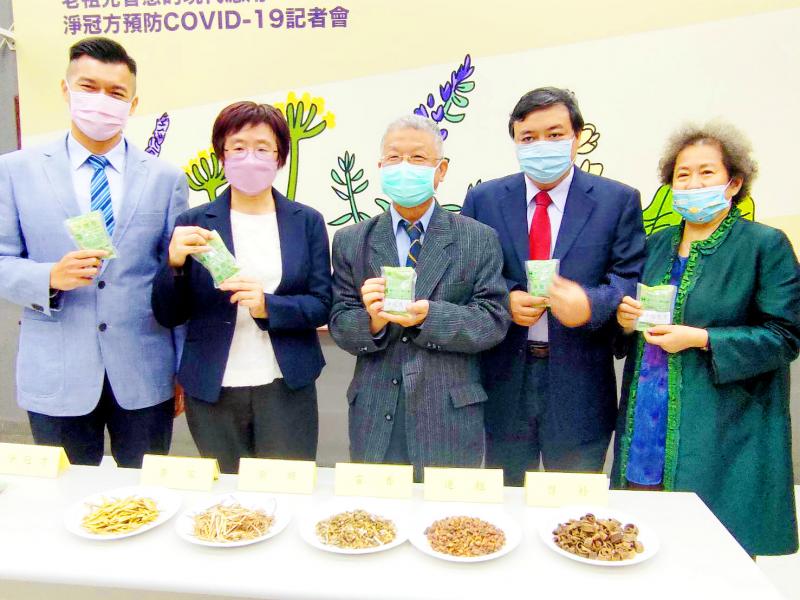Researchers at National Yang Ming Chiao Tung University (NYCU) who have developed a traditional Chinese medicine formula to suppress COVID-19 yesterday said that they plan to transfer the rights to the product on a non-profit basis.
The formula, known as “Jing Guan Fang,” contains weeping forsythia, Baikal skullcap, Chinese thorowax root, Magnolia officinalis bark and Korean mint, Hsu Chung-hua (許中華), a professor at NYCU’s Institute of Traditional Medicine, told a news conference, adding that it helps to suppress COVID-19 infection and symptoms.
The product was developed early in the COVID-19 pandemic, before vaccines became available, by drawing on knowledge from the SARS coronavirus, a close relative of SARS-CoV-2, which causes COVID-19, said Hsu, who is director of Taipei City Hospital’s Linsen Chinese Medicine and Kunming Branch.

Photo: Wu Po-hsuan, Taipei Times
Researchers from February to May 2020 conducted an initial study, distributing the product to frontline medical workers and hospital personnel, Hsu said.
Of the 1,086 people who took the formula, about 90 percent reported a reduction in sore throat, cough and other common cold symptoms, he said.
Based on the results, researchers at NYCU’s Institute of Traditional Medicine and Institute of Pharmacology conducted animal tests for the product, he said.
The formula “significantly reduced” the expression of two proteins in the lungs — ACE2 and TMRSS2 — which are receptors for SARS-CoV-2, thus impeding the process by which it binds to host cells, Hsu said.
The product was also effective when administered to laboratory mice as an inhalable drug, he added.
The formula is only available by prescription from doctors of Chinese medicine at public hospitals, Hsu said, adding that it should only be used as a supplement to COVID-19 vaccines.
By transferring the formula, a company could seek regulatory approval to make it available over-the-counter, thus allowing more people to access it, he said.
NYCU vice president Cheng Tzu-hao (鄭子豪) said that the university was looking for a manufacturer to whom it could transfer the rights to the formula on a charitable basis, citing the Oxford-AstraZeneca COVID-19 vaccine partnership as an example.
The NYCU team’s research was published on March 21 in the Frontiers in Pharmacology journal.

A preclearance service to facilitate entry for people traveling to select airports in Japan would be available from Thursday next week to Feb. 25 at Taiwan Taoyuan International Airport, Taoyuan International Airport Corp (TIAC) said on Tuesday. The service was first made available to Taiwanese travelers throughout the winter vacation of 2024 and during the Lunar New Year holiday. In addition to flights to the Japanese cities of Hakodate, Asahikawa, Akita, Sendai, Niigata, Okayama, Takamatsu, Kumamoto and Kagoshima, the service would be available to travelers to Kobe and Oita. The service can be accessed by passengers of 15 flight routes operated by

GIVE AND TAKE: Blood demand continues to rise each year, while fewer young donors are available due to the nation’s falling birthrate, a doctor said Blood donors can redeem points earned from donations to obtain limited edition Formosan black bear travel mugs, the Kaohsiung Blood Center said yesterday, as it announced a goal of stocking 20,000 units of blood prior to the Lunar New Year. The last month of the lunar year is National Blood Donation Month, when local centers seek to stockpile blood for use during the Lunar New Year holiday. The blood demand in southern Taiwan — including Tainan and Kaohsiung, as well as Chiayi, Pingtung, Penghu and Taitung counties — is about 2,000 units per day, the center said. The donation campaign aims to boost

ENHANCING EFFICIENCY: The apron can accommodate 16 airplanes overnight at Taoyuan airport while work on the third runway continues, the transport minister said A new temporary overnight parking apron at Taiwan Taoyuan International Airport is to start operating on Friday next week to boost operational efficiency while the third runway is being constructed, the Ministry of Transportation and Communications said yesterday. The apron — one of the crucial projects in the construction of the third runway — can accommodate 16 aircraft overnight at the nation’s largest international airport, Minister of Transportation and Communications Chen Shih-kai (陳世凱) told reporters while inspecting the new facility yesterday morning. Aside from providing the airport operator with greater flexibility in aircraft parking during the third runway construction,

American climber Alex Honnold is to attempt a free climb of Taipei 101 today at 9am, with traffic closures around the skyscraper. To accommodate the climb attempt and filming, the Taipei Department of Transportation said traffic controls would be enforced around the Taipei 101 area. If weather conditions delay the climb, the restrictions would be pushed back to tomorrow. Traffic controls would be in place today from 7am to 11am around the Taipei 101 area, the department said. Songzhi Road would be fully closed in both directions between Songlian Road and Xinyi Road Sec 5, it said, adding that bidirectional traffic controls would